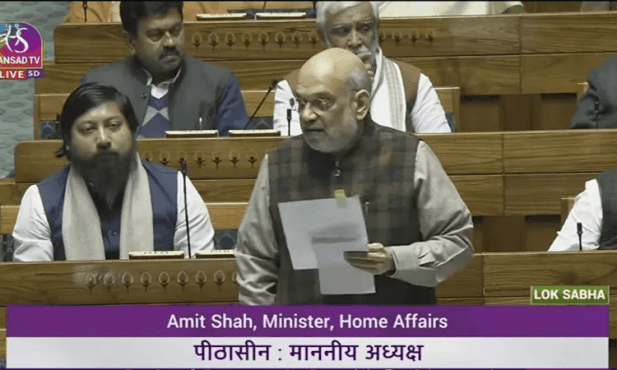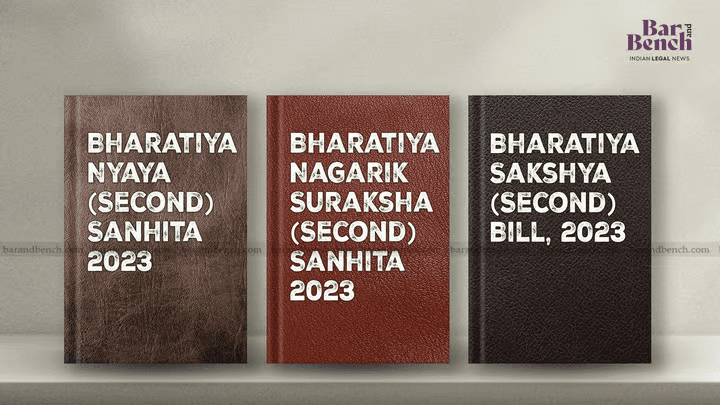Highlights Of criminal law amendment Bills Replacing IPC, CrPC & Evidence Act
In this post we will show you the Highlights Of criminal law amendment Bills 2023.
The Lok Sabha on 20.12.2023 and Rajya Sabha on 21.12.2023 passed three criminal law bills, The Bharatiya Nyaya (Second) Sanhita 2023, The Bharatiya Nagarik Suraksha (Second) Sanhita 2023 and The Bharatiya Sakshhya (Second) Bill 2023, which seek to repeal and replace the Indian Penal Code 1860, Code of Criminal Procedure 1973 and the Indian Evidence Act 1872.

Here are the Highlights Of criminal law amendment Bills
- Terrorist Act’ is defined as a separate offence under the Bharatiya Nyaya Sanhita (BNS). It will include acts which attack India’s unity, integrity, sovereignty, security, economic security, or spreads terror among any group
- The offence of ‘sedition’ omitted. BNS penalises acts endangering the unity and integrity of India(Clause 150). While sedition criminalised acts against the government, the BNS replaces the government with the country. ‘Rajdroh’ has been changed as ‘deshdroh’. Citizens have the right to speak against the government and it should be protected. But acts against the nation cannot be tolerated.
- ‘Mob lynching’ has been made a separate offence under the BNS, with a maximum punishment of death penalty.
- For several minor offences, ‘Community service’ has been made an option of punishment instead of imprisonment.
- Provisions made to ensure compulsory collection of forensic evidence in the investigation, which will strengthen prosecution.
- Audio-video recording of the statement of the victim of a sexual violence case made mandatory.
- There will be an independent Director of Prosecution in every district to decide whether appeals should be filed, independent of the recommendations of the police or prosecution.
- Provisions introduced to fix the accountability of the police.
- Provisions introduced to ensure victim-centric justice.
- Provisions made for Zero FIR registration. Victim can approach any police station, not necessarily the jurisdictional police station. The FIR will be transferred to the jurisdictional police station within 24 hours.
- Courts cannot allow the State to withdraw cases without hearing the victims.
- Serving of copies of the police report on the victim made compulsory. Victim to be informed of the progress of the investigation within 90 days.
- All inquiries and trials can be conducted in electronic mode.
- Offences against the human body, offences against women and children brought to the beginning of the BNS. For example, murder is now placed at cluase 102 of the BNS, instead of Section 302 in the IPC.
- Separate provisions to deal with offences against women and children. In case of rape of a girl under 18 yrs, life imprisonment and death penalty can be given. In gang rape, 20 years or imprisonment for rest of life. Consensual sex with a wife aged above 15 was not an offence as per IPC; this age limit now increased to 18 years.
- For ‘Hit and Run’, the punishment is up to 10 years imprisonment. But if after the accident, the offender takes the victim to the hospital, or police, lesser punishment will be given.
- ‘Snatching’ has been made a separate offence.
- For the offence of ‘grievous hurt’, a separate provision made to deal with cases where the victim becomes brain dead to prescribe more stringent punishment up to ten years.

Provisions relating to FIR, chargesheet, trial
- CrPC did not prescribe any time limit for FIR. But BNSS prescribes compulsory timeframes. FIR has to be registered within 3 days of making a complaint in cases of lesser offences. For offences with imprisonment between 3 and 7 yrs, within 14 days preliminary investigation has to be completed and FIR should be registered on that basis.
- Further investigation has to be completed within 90 days of filing the first chargesheet. Leave of the Court needed to continue further investigation beyond this period.
- Magistrate has to decide on taking congizance of the chargesheet within 14 days.
- Time limit introduced for sending the medical reports of victims of sexual violence cases.
- Timeline prescribed for filing discharge applications, framing of charges, deciding discharge petitions.
- Trial in absentia. If accused does not appear before court within 90 days, trial can be carried out in absentia.
- For first time offenders, if undertrial detention for 1/3rd period of sentence then can be released, in other cases, 1/2 period.
- Judgment has to be delivered within 45 days after conclusion of hearing.
- Only convict can file mercy petition against death penalty. NGOs or third parties cannot file mercy petition. Mercy petition has to be filed within 30 days after the decision of the Supreme Court on appeal.
- e-FIR : Provisions introduced for electronic registration of FIR. This will particularly benefit women, who might be hesitant to appraoch police station to report sexual violence.
- Video recording made compulsory during search procedures.
- Visit of Forensic Science Laboratory team made compulsory at crime sites. Forensic evidence will ensure conviction rates will increase.
- Summary Trials – Earlier, summary trials were possible only for offences punishable upto 2 years. Now it has been increased to three yeras.
- If no decision is taken on sanction for prosecution of civil servants within 120 days, it will be presumed that sanction has been granted.
- Provisions made for seizure of property of fugitive offenders. Earlier, in only 19 offences, the accused could be declared as fugitives. Now, it has been increased to 120 offences.
- New Witness Protection scheme brought, which every State has to notify.
- Provisions introduced to sell material objects and vehicles seized in crimes, with the permission of court, within 30 days, after taking video-photographic evidence. This will lessen the burden of police stations across the country where crime properties are left undisposed for decades.
- Smartphone, laptop, messages, website, and locational evidence included in the definition of proof
- Provisions introduced to allow use of electronic evidence as primary evidence.
- The hierarchy of criminal courts made uniform across the country. Classification of metropolitan areas and Metropolitan Magistrates removed.
Do let us know your thoughts on these laws.
